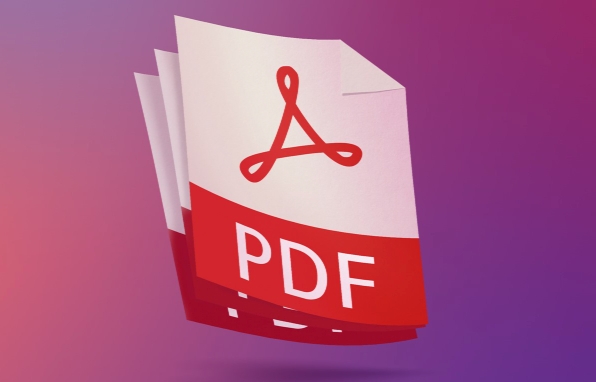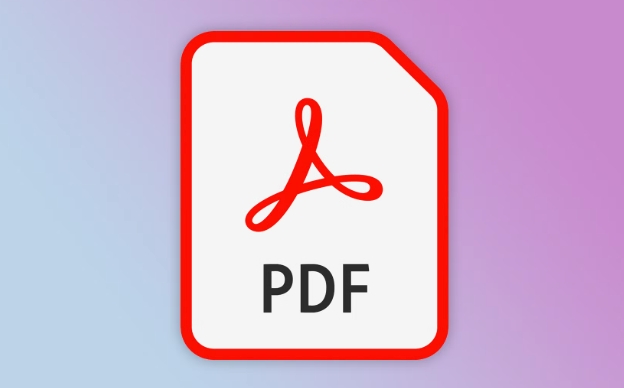How to convert a Word document to PDF using Adobe Acrobat?
Jul 30, 2025 am 12:33 AMThe steps to convert Word documents to PDF using Adobe Acrobat are as follows: 1. Make sure that the document has no typography problems and closes redundant programs using Acrobat > Create PDF to select and convert files to preserve editability; 3. Or use the printing function, select the "Adobe PDF" virtual printer to convert and customize output settings; 4. Pay attention to font embedding, margin adjustment, image compression and security settings to avoid common problems. Following the above method can ensure smooth conversion and complete format.

Using Adobe Acrobat to convert Word documents into PDF is actually very simple. The key is to be accurate in the operation steps, otherwise errors may occur or the format may be messed up. Let me tell you how to do it.

1. Preparation: Confirm the software version and document status
Before you start converting, make sure you are using Adobe Acrobat (not Acrobat Reader), because only the full version of Acrobat has editing and conversion capabilities. Common versions such as Acrobat Pro DC.

At the same time, open your Word document in advance and check whether there are any typesetting problems in the content and whether the pictures are displayed normally, so as to avoid the formatting being found after exporting.
- Close unnecessary background programs and release system resources
- If the Word document is in .doc format, it is recommended to save as .docx first
- Make sure Acrobat is installed and running properly
2. Use the "Create PDF" function directly
This is the most direct way. Acrobat provides a tool specifically designed to create PDFs from other files.

The operation steps are as follows:
- Open Adobe Acrobat
- Click "Tools" > "Create PDF" in the main interface
- Click "Select File" to find the Word document you want to convert
- Click the "Create" button and wait for the conversion to complete
- Finally, save the generated PDF file
The advantage of this method is that it retains the editability and most of the format of the original document, suitable for scenarios that require subsequent modification or printing.
3. Use the Print function to convert indirectly
If you cannot find the option to "Create PDF" or you want to control more output settings, you can use the printing function to convert.
Specific operations:
- Open Word Document
- Press Ctrl P or click File > Print
- Select "Adobe PDF" in "Target Printer"
- Click "Print" and the save path dialog box will pop up.
- Select the save location and click "Save"
This method is essentially generating PDFs through a virtual printer. Although the process is one step further, it can customize page scope, quality and other options, which is suitable for users with relatively high output requirements.
4. Precautions and FAQs
If you are not careful, some details may cause the conversion to fail or the effect is not good.
- Font missing : If Word uses special fonts, it is recommended to embed fonts in Acrobat (usually handled automatically when "creating PDF")
- The page margin is wrong : Sometimes the Word page settings are inconsistent with the PDF output, so it is best to preview the print layout in Word in advance
- File too large : inserting a large number of high-definition pictures will cause PDF files to bloat. You can compress the pictures in Word and then export them.
- Security settings : If you want to restrict others from copying content, you can set password protection or permission restrictions in Acrobat
Basically that's it. The whole process is not complicated, but some details are easily overlooked, especially in terms of format compatibility and output settings. As long as you follow the above method step by step, there will generally be no problem.
The above is the detailed content of How to convert a Word document to PDF using Adobe Acrobat?. For more information, please follow other related articles on the PHP Chinese website!

Hot AI Tools

Undress AI Tool
Undress images for free

Undresser.AI Undress
AI-powered app for creating realistic nude photos

AI Clothes Remover
Online AI tool for removing clothes from photos.

Clothoff.io
AI clothes remover

Video Face Swap
Swap faces in any video effortlessly with our completely free AI face swap tool!

Hot Article

Hot Tools

Notepad++7.3.1
Easy-to-use and free code editor

SublimeText3 Chinese version
Chinese version, very easy to use

Zend Studio 13.0.1
Powerful PHP integrated development environment

Dreamweaver CS6
Visual web development tools

SublimeText3 Mac version
God-level code editing software (SublimeText3)

Hot Topics
 How to transfer an Adobe Acrobat license to a new computer?
Jul 04, 2025 am 12:01 AM
How to transfer an Adobe Acrobat license to a new computer?
Jul 04, 2025 am 12:01 AM
To transfer the Adobe Acrobat license to a new computer, you must first log out on the old device and release the activation permission, and then complete the activation with the new computer login account. The specific steps are: 1. Open Acrobat on the old computer and click on the avatar or "Help" > "Log out" to log out; 2. Download and install Acrobat for the new computer and log in with the original account to automatically identify the license; 3. If the activation fails, check the network, clear the cache, unbind the old device through the Adobe account page, or contact customer service to solve the problem. The key point is to ensure that the old device has been logged out, clear the local cache and update the online device list before the migration can be completed smoothly.
 How to create a custom brush in Photoshop
Jul 08, 2025 am 01:01 AM
How to create a custom brush in Photoshop
Jul 08, 2025 am 01:01 AM
The steps to create a custom brush in Photoshop are as follows: 1. Select a pattern with clear edges and suitable for brushes, such as hand-painted textures or photo parts, and adjust it to the appropriate size; 2. Use the "Magic Wand Tool" or "Quick Selection Tool" to remove the background to ensure that the pattern is in an independent selection; 3. Create a basic brush through "Edit > Define Brush Presets"; 4. Adjust the parameters such as "Shape Dynamic", "Scatter", "Text" and "Transfer" in the "Brush" panel to make the strokes more natural; 5. Finally, click "Save As Brush" to save as a .abr file for convenience of subsequent use and sharing.
 How to use the quick selection tool in Photoshop
Jul 06, 2025 am 12:01 AM
How to use the quick selection tool in Photoshop
Jul 06, 2025 am 12:01 AM
Photoshop's quick selection tool is suitable for selecting areas with similar colors and clear boundaries. The usage methods include: 1. Find and activate the tool, right-click or long-press to switch or press the shortcut key W to ensure that the layer is unlocked; 2. Adjust the brush size, combine the Alt or Option key to switch the selection mode, Shift key to add selection, and improve accuracy through the option bar setting sampling method; 3. Use the "Select the Subject" function to assist in selection, and then manually optimize edge details, especially suitable for portraits or product images.
 How to recover a corrupted AutoCAD file?
Jul 09, 2025 am 01:16 AM
How to recover a corrupted AutoCAD file?
Jul 09, 2025 am 01:16 AM
When AutoCAD file is corrupted, you can take the following steps to try to restore: 1. Check the automatic backup of the file, check whether there is a .bak or .sv$ file in the folder where the original .dwg file is located, and rename the .bak file to .dwg to open it; 2. Use the RECOVER command to try to repair the file, and if it fails, use the -OPEN command to open the file for partial recovery; 3. Use third-party tools such as DataNumenDWGRepair, RecoveryToolboxforDWG, etc. to deal with seriously damaged files. To prevent future damage, you should save regularly and use "Save As" to refresh the file structure, keep the software updated, avoid saving through network drives, enable automatic save and set up
 How to fix remote desktop connection issues
Jul 08, 2025 am 01:03 AM
How to fix remote desktop connection issues
Jul 08, 2025 am 01:03 AM
Remote Desktop connection problems can be checked through the following steps: 1. Check the network and firewall settings to ensure that the TCP3389 port is open; 2. Confirm that the remote desktop function is enabled and supported by non-home version systems; 3. Verify user permissions and belong to the "RemoteDesktopUsers" group or administrator; 4. Handle black screen or lag, adjust the display options or restart the remote computer. Check them one by one in order, and most problems can be solved.
 How to remove password protection from a PDF in Adobe Acrobat?
Jul 05, 2025 am 12:36 AM
How to remove password protection from a PDF in Adobe Acrobat?
Jul 05, 2025 am 12:36 AM
To remove PDF password protection, use Adobe AcrobatPro and have the document owner password. The steps include: 1. Open Adobe AcrobatPro and select a password-protected PDF file; 2. Enter the correct owner password; 3. Go to "Tools" > "Protection" > "Encryption" > "Remove Security"; 4. Click "OK" in the pop-up window to confirm the removal. If AcrobatPro is not available, you can ask others for assistance or use third-party decryption tools, but you need to pay attention to privacy risks. Common problems include invalid password, grayed out security settings, and prompting for passwords after removal. The solution is to check password input, try to convert file formats, or update software versions. If it cannot be resolved, please contact A
 How to use the magnetic lasso tool in Photoshop
Jul 04, 2025 am 01:00 AM
How to use the magnetic lasso tool in Photoshop
Jul 04, 2025 am 01:00 AM
The magnetic lasso tool is suitable for images with obvious edge contrast. The key points include: 1. Use the shortcut key L or select the tool from the tool group. After clicking the starting point along the edge of the object, slowly move the mouse, and the tool will automatically absorb and add anchor points; 2. In terms of parameter settings, the width is recommended to be set to 10~30, and the edge contrast is default. The higher the frequency, the more anchor points; 3. In actual application, other tools can be replaced in the blurred edges. Zooming the image will help with accurate selection. If necessary, the anchor points can be adjusted manually. Mastering these skills can effectively improve the efficiency of the selection.
 How to get Photoshop for free
Jul 12, 2025 am 12:34 AM
How to get Photoshop for free
Jul 12, 2025 am 12:34 AM
Adobe Photoshop does not have a permanent free version, but can be legally used in the following ways: 1. The official website provides a 7-day free trial, complete functions but automatic renewal is required; 2. Use a simplified version based on the browser (Beta), which supports basic editing functions; 3. Students or teachers can obtain a full-featured version through the school education plan; 4. Consider alternative software such as GIMP, Photopea, Krita or Canva Pixlr to meet daily needs. The above methods can meet the needs of different users and ensure legal and compliant use.






